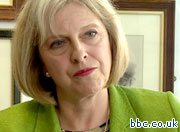The Home Secretary Theresa May has indicated that new Extremism Disruption Orders (EDOs) will not prevent people saying they oppose gay marriage, but fears over the broad definition of “extremism” remain.
Speaking on BBC Radio 4’s Today programme, May responded to challenges from John Humphrys that the approach was “woolly”.
He asked, “If you don’t believe in gay marriage, you are absolutely entitled not to believe in gay marriage and presumably you would still be entitled to say ‘I don’t believe in gay marriage, I think it damages society'”.
Protecting values
May replied that “of course you would be”. She went on to state that the powers are aimed at protecting values such as “a belief in democracy, a belief in the rule of law, a belief in tolerance for other people, equality, an acceptance of other people’s faiths and religions”.
The Christian Institute, the National Secular Society, civil liberties groups, several newspapers and politicians have all criticised the broad nature of EDOs.
The Institute’s Deputy Director Simon Calvert said: “While everyone applauds the principle of tackling Islamic extremism, comments by David Cameron and other senior members of the Government suggest EDOs will exceed even Labour’s notorious Racial and Religious Hatred Bill or Section 5 of the Public Order Act.”
Section 5
A successful campaign against Section 5 of the Public Order Act led to it being amended. It had originally outlawed “insulting” words or behaviour, leading to police action against street preachers and protestors.
Campaigners said it was a “dangerously broad” offence, and had a detrimental effect on free speech.
Mr Calvert added: “Last year the Government was forced to back down on proposals to outlaw ‘being annoying in a public place’. Now it looks like they are returning to their theme with a vengeance.”
Defending free speech
“The Christian Institute warns the Government not to rush through these measures, but to engage with groups with a track record of defending free speech.”
The Prime Minister David Cameron has said that the Queen’s Speech will include plans for EDOs within a new counter-extremism Bill.
EDOs would place restrictions on individuals or organisations who “spread, incite, promote or justify hatred” against others on a number of grounds, including religion, sexual orientation and transsexualism.

